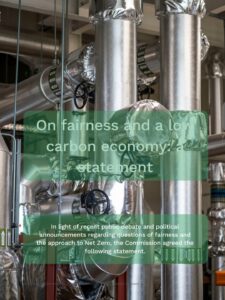On fairness and a low carbon economy: a statement

Statement from the Just Transition Commission
In light of recent public debate and political announcements regarding questions of fairness and the approach to Net Zero, the Commission agreed the following statement.
The strength of a just transition approach is that it offers a structured way of working through the fairness issues associated with policies that reduce our emissions. The aspiration to achieve a just transition must never be used as rhetorical cover for inaction or delay. Bold and innovative planning and delivery to support a just transition will be the key enabler of the kinds of changes that lie ahead, in terms of how we work, move around, heat our homes, the food we eat, and how our land and its resources are shared. While we have made decent progress in reducing emissions, this has been achieved principally through ongoing work to expand the amount of energy generated from renewable supply. What comes now is the hard stuff that touches directly on our everyday lives and livelihoods.
If changes that carry specific costs for particular people are automatically discounted on the grounds of fairness, there will be no transition, and neither will there be justice. Heat pumps, deep retrofit of buildings and other key technologies and innovations associated with a low carbon economy are currently prohibitively expensive for most households. This cannot be left to consumers asked to “make sacrifices” in isolation. We will be left behind by other countries and millions will continue to suffer the ill-effects of cold, damp, poorly insulated housing and ruinously high energy costs. The role of government must be to provide the transformative leadership, serious strategic investment and active co-ordination that fundamentally changes this equation and maximizes the economic and social benefits of these new forms of goods and services.
Mitigation and adaptation measures promise major improvements for most people. Carbon Brief analysis in 2023 found our energy bills are almost £10bn more than they would have been if climate policies such as energy efficiency support had not been scrapped over the past decade. The Climate Change Committee reports as many as 725,000 net new jobs in low carbon sectors could be created across the UK in the next six years, with clear opportunities to benefit areas with historically low employment and to diversify the workforce. Effective communication and engagement to deepen popular understanding of just transition and the wide-ranging benefits it will bring will be key in limiting the impact of misinformation.
The climate and nature emergencies afflict the poorest and most marginalised worst of all, exacerbating existing inequalities. This demands bold and innovative action to build genuine social and economic resilience in place of a status quo that is deeply unjust, as the number of people in fuel poverty and ongoing cost of living crisis shows. Policies and strategies that prolong business-as-usual in the name of fairness may achieve other ends, but they will not help to deliver a low carbon economy in a fair way.